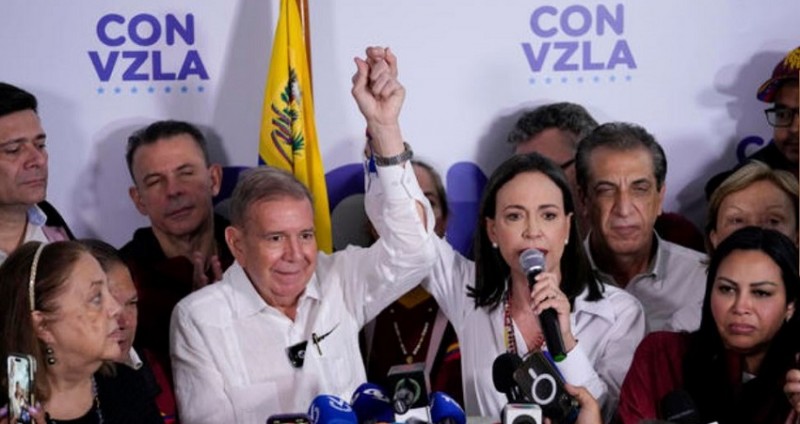
Caracas, Venezuela: The ongoing presidential election in Venezuela has sparked a dramatic showdown between the government and opposition. While the official results declare President Nicolás Maduro the winner, opposition leaders are contesting the outcome, claiming a decisive victory for their candidate, Edmundo González.
In his initial response, opposition candidate Edmundo González declared that both Venezuelans and the international community are aware of the true electoral outcome. Maria Corina Machado, a key opposition figure, asserted that González won by an "overwhelming" margin, based on early reports from campaign representatives at about 40% of polling stations across the country.
According to the National Electoral Council, which is aligned with Maduro, the President secured 51% of the vote compared to González's 44%. However, the Council has yet to release detailed vote counts from the 30,000 polling booths nationwide, creating difficulties in verifying the results.
International Skepticism Grows
The official results have been met with skepticism from various international leaders. U.S. Secretary of State Antony Blinken voiced concerns, stating that the announced results might not reflect the true will of the Venezuelan people. Chilean President Gabriel Boric and Guatemalan President Bernardo Arevalo also expressed doubts, with Boric emphasizing that results lacking verifiable details would not be recognized. Uruguayan President Luis Lacalle Pou described the situation as an "open secret," suggesting that the outcome was predetermined.
In contrast, China congratulated Maduro on his victory, and Cuban President Miguel Díaz-Canel praised the result as "historic."
Delay and Allegations
The delay in releasing the results—six hours past the official closing time—indicated internal debates within the government. When Maduro finally addressed his supporters, he accused foreign adversaries of attempting to disrupt the voting process, though he provided no evidence for his claims. He assured his supporters that those attempting to incite violence would face "justice."
González, a retired diplomat who was chosen as a last-minute candidate for the opposition, represents the most significant challenge to Maduro's rule. His campaign received enthusiastic support from Venezuelans, including emotional reactions from supporters like Merling Fernández, who celebrated what they believed to be a landslide victory for González.
Election Impact and Economic Concerns
The election's outcome is expected to have wide-ranging effects across the Americas. With millions of Venezuelans already having left the country in search of better opportunities, the result may influence further migration trends. The election was strategically timed to coincide with what would have been the 70th birthday of former President Hugo Chávez, whose legacy has been overshadowed by the ongoing crisis under Maduro's leadership.
Venezuela, once home to the largest proven oil reserves and a booming economy, has faced severe economic decline under Maduro. The country has been plagued by plummeting oil prices, hyperinflation exceeding 130,000%, and widespread shortages, leading to social unrest and mass emigration. Economic sanctions imposed by the U.S. have exacerbated the crisis, deepening the country's economic woes.
Despite Maduro's promises of economic stability and growth, many Venezuelans continue to suffer from extreme poverty, with basic necessities becoming increasingly unaffordable. The opposition has capitalized on these economic hardships, promising reforms to address inequalities and encourage Venezuelans living abroad to return home.
As Venezuela grapples with the aftermath of its contentious election, the international community remains divided on the legitimacy of the results. With the political and economic future of the country hanging in the balance, the situation continues to unfold, leaving many uncertain about the path forward.
Latest Updates: